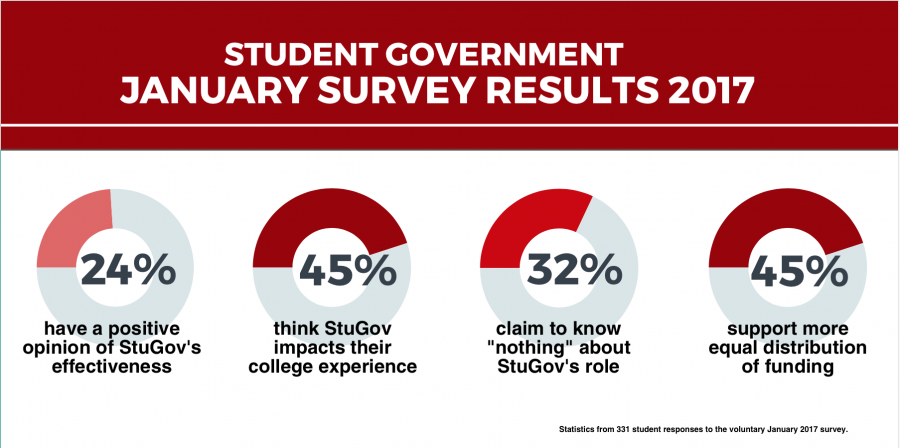Only one in four students believe student government is effective. Less than half believe student government impacts their experience at Lafayette in any way.
But for Chair of Representation for Lafayette College Student Government Chirag Nijjer ’20, the most startling revelation from the survey was that only about one in five students responded to it.
“As chair of representation, this, combined with the amount of confusion shared around the role of student government, concerns me and has become a major aspect of my agenda,” he added.
In January, student government circulated a voluntary survey meant to gauge the student body’s views on the election process, student government’s transparency, the agenda for this term and other miscellaneous issues.
According to president Bilal Akbar ’18, the most surprising of the results was student government’s lack of social media presence. Roughly half of all participants wrote that they “somewhat know” about student government’s role and functions, though 72 percent do not follow the group on Facebook or Instagram.
“Only 19 to 20 percent of the student body, out of the sample size we had, which I think was decently representative, said that they followed our Facebook or followed our Instagram account,” he said. “And we have about 1,500 followers on our Facebook page.”
“That came as a surprise to me,” he continued. “I think there was a gap between students who actually follow us on Facebook or Instagram and students who thought they followed us.”
Similarly, the turnout for the survey itself concerned Nijjer, who was most surprised by “the realization that a very small portion of the student body had actually taken the time to reply.”
In addition to results on student government’s campus role, a prominent question was also the distribution of club funding. Almost half of those surveyed supported a resolution to rework the annual budget allocations for student organizations, while just 6 percent opposed the move. The remaining portion did not know enough to judge adequately.
Currently, seven of the more than 80 clubs receive 53 percent of student government’s club funding. The resolution passed created a committee to help those seven clubs find alternative sources of funding. In the election debates, club funding was one of the most popular topics.
The survey shed some light on potential changes to the election process. The participants leaned in favor of only allowing members of a particular class to vote for their class representatives, as well as to maintain the five votes per person system. While voters split roughly evenly on the issue of allowing presidential and vice presidential candidates to share a ticket, most agreed that separate tickets should be permitted.
Student government said 424 students responded, although The Lafayette obtained a report with only 331 responses. Akbar said the results did not change in general for the additional responses, which came later.
In addition to issues pertaining directly to student government, deeper questions surrounding inadequate representation for conservative, international and students of color came into focus. Akbar took the time to comment on the feelings of underrepresentation held by the aforementioned groups on campus.
“We’re just coming out of an election season, so there are people on both sides who are concerned about how political opinions on campus are discussed,” he said. “So there were a lot of students of a conservative political orientation who thought they were targeted, not only by faculty, but also by a majority of the student body which is admittedly liberal-leaning or more moderate.”
“On the other side, obviously there were a lot of students of color and international students who thought that enough wasn’t being done in terms of responding to their concerns and their problems,” he added.
He ended on an optimistic note, saying that the problems of conservatives, students of color and international students were “something I believe I have a much bigger opportunity to work on in terms of helping.”
Both Akbar and Nijjer stressed the importance of surveys as tools for properly gauging student body opinions, and Akbar expressed a desire to “make [the surveys] a regular thing, so at the beginning of term survey, and then midterm, and then an end of term, we can essentially track our progress on a lot of issues.”




































































































